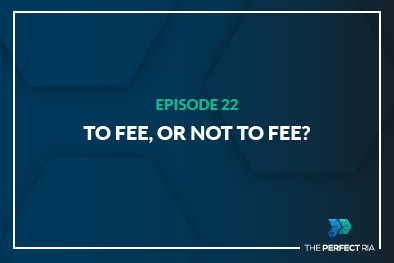Matt and Micah offer clear perspectives on charging clients fees.
You have probably spent a considerable amount of time researching the ‘right’ amount to charge clients.
Maybe you have circled around a fee-based system. Or your company might hinge on a commission-based system.
Matt and Micah stress that the way you charge clients is relative to the value you can bring clients. This is much more important than being fee-only or commission-based just because they are staples in your industry.
With this in mind, Matt and Micah encourage you not to stigmatize any one type of method for charging clients, but instead to make a business plan that is best for your company and clients.
In this sense, it’s not about asking questions like: “what is the most industry-respected method for determining fees?”
It’s about posing questions that incorporate the needs of the clients, the value you bring to them, and at the same time growing the necessary revenue for your firm.
To start doing this, you need to be transparent with your clients.
Integrity and Fee Transparency
One of the most important points that Matt and Micah make in this episode is that no method of charging clients is inherently bad.
Commissions often get a bad rap, but there is nothing wrong about the method from an objective standpoint. In that sense, all judgments towards acts of fiduciary malfeasance should be reserved for the person in charge of charging, so to speak.
Again, this means that if your firm generates revenue through a fee-only approach, fee-based, commission, or hybrid of those, it is the advisor’s responsibility to bring the necessary value to justify any fee that is charged.
Integrity is key! And one way to guarantee integrity is fee transparency.
Transparency can be achieved by making sure you have a business plan drafted up that very simply states your fees, the methods you use, and other relative information for your clients.
This means there aren’t surprise fees or commissions being made that the client isn’t aware of. That sort of practice can detract from the trust your client needs to have in you and can hurt overall perceptions of your integrity.
But to really achieve this type of integrity and transparency, more often than not, a business plan is necessary.
More on Making a Business Plan
As Matt and Micah have stated in the past, a simple, bare-bones plan is really all that is needed for communicating every fee for clients.
And a plan is also important for finding the necessary fees that are relative to your firm. This means that a year from now, you will still have a well-functioning business. It also means that you have the necessary revenue coming in to give clients the massive value they need.
Even though Matthew admits that he didn’t have a business plan for determining fees during the early stages of his advising career, he does now and understands just how important it is.
As always, this is just a cursory glance at the complexity of the subject. Matt and Micah do a great job in this episode of simplifying what a lot of advisors overcomplicate.
There are a couple of anecdotes and experiences that Matt and Micha share that really do frame the content of this episode in a nuanced and exciting way. And you’d be hard-pressed to find a more succinct, self-contained conspectus of fees and how much to charge clients. Listen along!
Recommended Podcast

Navigating Client Mistakes: A Guide for Advisors [Episodes 316]
Mistakes happened, now what?
See More
Encore Episode: Accelerating Your Growth and Understanding Practice Valuations with Guest Ted Jenkin
elements that can make or break a potential sale
See More
From Business to Freedom With Jerome Myers [Episode 315]
The Importance of Post-Exit Planning
See More





